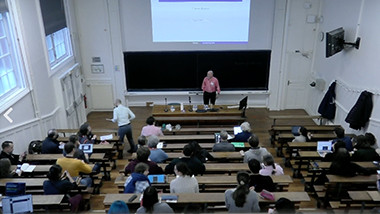
From connecting the dots to conjugacy of dynamical systems
De Pierre Arnoux
Apparaît dans les collections : Combinatorics, automata and number theory / Combinatoire, automates et théorie des nombres, Ecoles de recherche
An automorphism of a subshift $X$ is a self-homeomorphism of $X$ that commutes with the shift map. The study of these automorphisms started at the very beginning of the symbolic dynamics. For instance, the well known Curtis-Hedlund-Lyndon theorem asserts that each automorphism is a cellular automaton. The set of automorphisms forms a countable group that may be very complicated for mixing shift of finite type (SFT). The study of this group for low complexity subshifts has become very active in the last five years. Actually, for zero entropy subshift, this group is much more tame than in the SFT case. In a first lecture we will recall some striking property of this group for subshift of finite type. The second lecture is devoted to the description of this group for classical minimal sub shifts of zero entropy with sublinear complexity and for the family of Toeplitz subshifts. The last lecture concerns the algebraic properties of the automorphism group for subshifts with sub-exponential complexity. We will also explain why sonic group like the Baumslag-Solitar $BS(1,n)$ or $SL(d,Z), d >2$, can not embed into an automorphism group of a zero entropy subshift.
